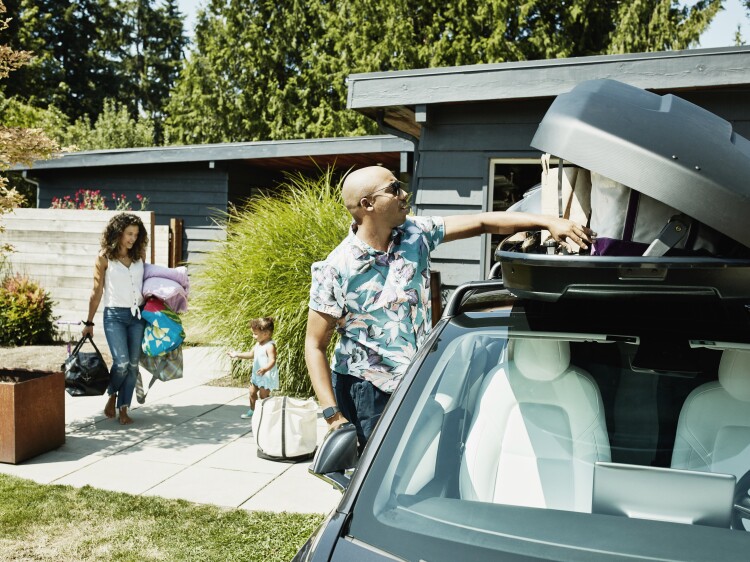Vacations can be a great way to reconnect with friends and family or gain solitude and get back in touch with your own needs and interests.
Whether you're longing for a weekend road trip or a week-long cruise, going on a trip takes preparation. Knowing how to budget for a trip by estimating costs, finding deals and saving money can help make your travel dreams a reality.
Why create a vacation budget?
Creating a budget for a vacation helps you avoid overspending and ensures you have enough money for all your planned activities. It allows you to prioritize what matters most, reduces stress and helps you make the most of your trip without financial worries.
Plus, estimating your costs goes hand-in-hand with creating an itinerary of how you'll reach your destination, the fun activities you'll do, what you'll eat and where you'll sleep. Anticipating your time off can provide its own boost.
How much to save for a vacation
You'll need to do some daydreaming and some research to know how much to save for a vacation. Your savings goal depends on the places you want to visit, your travel style and the activities you want to do.
A weekend car-camping and hiking trip will have a lower price tag (and require less planning) than a 10-day tour of Japan. International airfare, hotel rates, transportation within and between cities, multiple restaurant meals and attraction tickets will cost significantly more (and you'll need more time to plan it and save money). Prices also vary by time of year. If you're locked into traveling during your summer vacation or when your boss will give you time off, those limitations also will affect how much you need to save.
To protect your investment, you may want to buy trip insurance. It can help you recoup nonrefundable, prepaid travel expenses if you have to change your plans. When going overseas, travel medical insurance is a must to ensure you can get any care you might need without financial difficulties.
All told, you might need a couple hundred dollars or several thousand. You can use your estimate to create a savings goal and timeline, then adjust it as needed until you're financially prepared. Don't forget to add a cushion for unexpected costs.
Create your travel goals
As early as possible, sit down with any fellow vacation-goers—be they roommates, family or friends—and hash out the goals for your trip. Talk through each of these questions:
- How long do you want to be on vacation?
- Where do you want to go?
- What do you dream of doing on the trip?
- How do you want to get there?
- What kind of place do you want to stay at?
- What do you want to eat?
- What transportation do you need once you get there?
Getting specific about what you want to do and getting everyone on the same page are the foundations of a realistic budget.
Estimate your vacation costs
When you're planning a vacation on a budget, a spreadsheet or notebook can be a valuable resource to outline expenses for your trip. Your spending categories might look a bit different, but this is a list to get you started:
- Lodging
- Transportation (airfare, car rental, fuel, parking, ridesharing, transit tickets)
- Meals, drinks and snacks
- Trip insurance (for vacations where you're spending a lot of money upfront)
- Activities/entertainment (tickets, fees, equipment rental, etc.)
- Fees (resort charges, baggage fees, currency exchange costs)
- Tips for service
- Supplies (such as camping gear, special clothing or ski rentals)
- Souvenirs/gifts
- Travel documents (passport renewal, entry visas)
- Travel insurance
- Unexpected costs (save a little extra for possible price increases and last-minute purchases)
Create a high and low estimate for each item based on your research. For instance, visit websites for at least a few hotels or house rentals and get costs for a variety of potential trip dates. As you research, note if there are cancellation fees or signs that your destination is booking up quickly, which could mean prices could go up.
It also can be helpful to add columns breaking down each estimate into the amount due at booking and what will be due or charged upon arrival. For example, you might want to buy plane tickets months in advance, but you might only owe a small hotel deposit at booking and the balance when you check out.
Create a savings timeline
Once you have an estimate that seems achievable, it's time to break down your
To take things to the next level, see how your monthly savings goals compare to when you'll need to pay for each part of your trip. For example, if you're going to save $400 a month and need to buy plane tickets in three months, will $1,200 cover your fare? Airfare can be hard to predict, but this calculation can help you see if you need to accelerate your savings now, then ease up later.
Protect your savings
Before you get started, decide how you'll keep your vacation savings separate from your other money. Some banks let you create different buckets for different goals within a single savings account. Another option is to open an account at a different bank to create an extra barrier to spending the money on something else.
Consider how inflation will impact your goal, too. A
Track your spending and adjust your budget as needed
If you easily earn more than you spend, saving for your vacation may be as simple as
If your budget is tighter, managing your money carefully can protect against sacrificing vacation savings. Here are some tips that may help:
- Consolidate your spending. Use a single credit or debit card for all your bills and purchases to make tracking easier.
- Track every dollar. Carry a small notebook (or use a notebook app on your phone) to write down every expense at the moment you incur it. Keep a running total so you always know where you stand and can adjust right away if you're getting off track.
Try a new budget method. If you haven't budgeted before or the process didn't work for you, learn about the
different budgeting methods and consider trying one that could help you meet your travel savings goal.75/15/10 budget. A few budgeting strategies suggest dividing your money into categories, and this version shifts a larger portion to ongoing expenses. It allocates 75% of your after-tax income to costs like rent, groceries and entertainment, 15% to investments and 10% to savings.50/40/10 budget. This budgeting method prioritizes essential spending (50% of your take-home pay) then saving and investing (40%) while still allowing room for discretionary spending (10%). It's a good choice if you have ambitious savings goals and want to keep discretionary spending in check.50/30/20 budget. Under this system, you allocate 50% to your needs, 30% to your wants and 20% to your savings.Envelope budget system. Rather than paying with debit or credit and tracking spending online, the envelope system encourages you to create hard, tangible spending limits. Start each month by withdrawing cash from your bank account and dividing it among several envelopes that each represent a budget category. Once an envelope is empty, you can't spend in that category until next month — unless you can transfer money from a different envelope.Zero-based budgeting. This strategy assigns a specific purpose to every dollar of your monthly income. This doesn't mean you have to spend all your income. Rather, it motivates you to think ahead and evaluate your priorities each month so you're less likely to overspend or forget about a bill and more likely to save for your vacation and other goals.
- Review your spending for the previous three months. Look for expenses that are less important to you than your vacation. Then, decide how you'll cut back on similar costs going forward: Catch up with friends over coffee instead of dinner, for example.
- Cancel nonessential recurring subscriptions. If you miss them, you can decide where your priorities lie and reactivate them if you want.
Tips for sticking to your vacation budget
Once you're at your destination, temptations to blow your budget will abound (unless you're camping, perhaps). The same strategies that made your vacation dream a reality also can help you stick to your spending plan.
- Expect the unexpected. Include a slush fund in your initial budget. This way, you can afford spontaneous opportunities (like a last-minute deal on that helicopter tour you had your eye on) and solve problems (like needing to buy clothes because your luggage got lost).
- Set a daily budget. You don't have to abide by a strict daily limit, but you're more likely to stay on target when you start your day with an idea of how much you can spend on things like meals and souvenirs. Your budget can be different each day depending on what you're doing.
- Consider off-peak travel. Find out which times of year are the most expensive, least expensive and somewhere in between. The in-between time, also called shoulder season, is when you often can find the best combination of price and weather (and fewer crowds), making it a great time to travel if school and work schedules permit.
- Track expenses as you go. It's hard to predict costs like meals and taxis until you're at your destination. Keep a running total so you know where you stand.
- Choose budget-friendly activities. Shows, museums and tours can be expensive (though your research might uncover ways to get deals). Sometimes you'll get a better sense of a place—and find local gems—by riding around on public transportation or exploring on foot.
- Take time to consider unplanned purchases. See some local art you like at a gift shop? Leave the store without buying it, then come back later if you still want it. You also could see if the item is available for sale online, then decide if it's still enticing once you're back home.
- Adjust on the fly. You weren't planning to order the tasting menu, but now you want to indulge. Before you commit, decide what you're willing to change to make this fancy meal fit your budget.
- Pack smart. Take some just-in-case items (like cold medicine, spare sunglasses and a rain jacket) that won't bulk up your luggage but could save you a lot of money if you end up needing them. Also, some people like to travel with an empty suitcase so they can take souvenirs home and avoid shipping fees.
- Hit the grocery store. Exploring a grocery store at your destination can give you local insights. Buying just a few items could mean big savings on breakfast, lunch, snacks and drinks. Plus, spending less time at restaurants means more time to explore. Choose an extended-stay hotel and you even can cook in your room.
- Evaluate transportation options. In some locations, taxis or ride-shares will save you money; in others, it's better to rent a car or take public transit.
You might have to skip things you'd like to do or buy in the short term to meet your vacation savings goal. In those moments, remember that your budget is a path you've intentionally designed so you'll have the freedom to enjoy your trip without worrying about money.
How to plan a vacation on a budget: Tools & resources
- Travel guidebooks. Websites and travel vlogs are great for inspiration, but there's no substitute for a well-researched guidebook. It's curated the best experiences and itineraries, complete with cost estimates and money-saving tips.
- Travel agencies. A travel agent's services are often free; they earn commissions from travel providers when they book clients' trips. They know where to find the best deals and extra perks. Travel agents can be especially helpful when planning complex or unfamiliar trips (like a tour of Europe or your first cruise). They even can be your problem solver mid-trip if a flight gets canceled, your hotel room is awful, or you need to come home early.
- Travel apps. Every seasoned traveler has a favorite app, website or tool for
finding affordable airfare , curating memorable experiences and identifying top hotels. Thebest travel apps give you a wide array of choices to help you save money and enjoy yourself more. Just be aware that they may earn commissions when users book through them, and they may not display all your options. - Thrivent Money Canvas. Our
free money coaching tool can help you see where your money goes and start new habits. It can be especially helpful if you're new to budgeting, want the convenience of meeting online and could benefit from personalized advice and encouragement.
Popular low-budget destinations for couples & families
Looking for some inspiration to start planning your next romantic getaway or family vacation? Whether you want to experience awe-inspiring scenery, travel back in time or experience another culture, here are some trip ideas that may suit your budget.
Visit a national park
Consider Yellowstone and Grand Teton (Montana, Wyoming and Idaho), the Grand Canyon (Arizona), the Great Smoky Mountains (Tennessee and North Carolina), and Zion and Bryce Canyon (Utah).
Head to a big city
You easily can spend a week in New York or L.A., but also consider other metropolitan destinations that pack just as much to do on a different scale, such as San Francisco (California), Austin (Texas), Chicago (Illinois) or Phoenix (Arizona).
Explore historic sites
Some popular places to spend time taking in the sights are San Antonio (Texas), New Orleans (Louisiana), Philadelphia, (Pennsylvania), Atlanta (Georgia) and Washington, D.C.
Venture just outside the U.S.
You don't necessarily have to go very far to get away to another culture. Canada or Mexico may be near enough for you to drive or fly. And visiting the U.S. territories of Puerto Rico or the Virgin Islands doesn't even require a passport. You even may be able to find good rates to visit the Caribbean or Central America.
Vacationing on a budget FAQs
What is a realistic vacation budget?
A realistic vacation budget depends on your destination, mode of travel and what activities you want to do. A local road trip might cost a few hundred dollars total while an international vacation might cost thousands per person.
Is $5,000 enough for a vacation?
Yes, you can take a vacation for $5,000. It takes some planning and depends on how many people your budget needs to cover, how much it costs to get to and stay at your destination, and what you want to do once you get there.
How do I calculate a vacation budget?
You can calculate a vacation budget by listing each aspect of your vacation that you'll need to pay for and doing some research to estimate costs. Make sure to factor the time of year into your research as popular destinations will cost more during favorable seasons.
What if my estimated vacation budget is more than I can afford?
If your estimated vacation budget is more than you can afford, you can look for ways to cut travel costs, give yourself more time to save money or change your destination.
Having a plan is the key to a reinvigorating vacation
Traveling and taking time off may be luxuries, but they can also nourish our relationships and our souls, helping us show up as our better selves for the people we care about. A crucial factor in truly enjoying your vacation is knowing you can afford it. That means making a detailed vacation budget, strategizing to save the money and sticking to your plan.
There's no shame in asking for help with your finances, even when you're planning something fun. A







